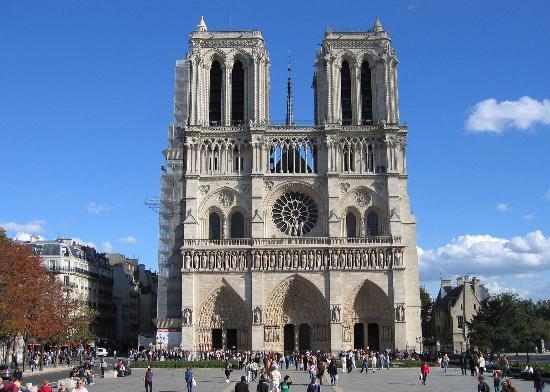
Week Two: A Period of Change (1870 - 1950)
Day Six: The Early Years (Late 1800's to 1919)
08-01-18
Activity 1: St Joseph's Cathedral
At the start of the 1900's, the British were initiating a ton of construction. They were building homes and community meeting places. One of the largest buildings made during this time was St Joseph's Cathedral in Dunedin.
The Notre Dame is another famous cathedral.

The full name of this cathedral is Notre-Dame de Paris.
It is located on the Île de la Cité in Paris, France.
The build started in 1163 and took over 200 years, and was finally opened in 1345.
The cathedral is 69m tall.
Activity 2: The Right to Vote
The first leader of New Zealand's government was Richard John Seddon, who led from 1893 to 1906 and was the leader of the Liberal Party. Women were not allowed to vote until a woman named Kate Sheppard led a suffragist movement. The Electoral Act passed on the 19th of September 1893, giving women the vote. New Zealand was the first country in the world to give women the vote, and many countries still didn't allow women to vote until very recently, including Saudi Arabia.
I believe that the fact that Saudi Arabian women weren't allowed to vote until 2015 is very unfair. Women are just as equal as men, and should be treated that way. Unfortunately, in Saudi Arabia women's rights are very poor. Women aren't allowed to drive, dress the way they want, or travel, and they cannot do simple things like open a bank account without a mans permission, and they are forbidden to leave home without a mans company. These rules need to change quickly so women can live the life they are supposed to live.
Bonus Activity: In Flanders Fields
A the beginning of the 19th century, New Zealand was at peace. Well, until World War I broke out in Europe and claimed the lives of 18,000 New Zealanders. Each year, on the 25th of April, we use ANZAC Day to remember the brave men and women who fought for our freedom.
The poem 'In Flanders Fields' by John McCrae is widely known.
In Flanders fields the poppies blow
Between the crosses, row on row,
 That mark our place; and in the sky
That mark our place; and in the skyThe larks, still bravely singing, fly
Scarce heard amid the guns below.
We are the Dead. Short days ago
We lived, felt dawn, saw sunset glow,
Loved and were loved, and now we lie,
In Flanders fields.
Take up our quarrel with the foe:
To you from failing hands we throw
The torch; be yours to hold it high.
If ye break faith with us who die
We shall not sleep, though poppies grow
In Flanders fields.
I really like this poem, and I believe it is a lovely way to honor the brave soldiers who fought for mine and New Zealand's freedom. It makes me feel that I can feel carefree and know that I am safe here in New Zealand. It makes me feel sad for the families of the lost, but also in a way proud as their loved ones saved us from war and destruction.
Hi there Crystal,
ReplyDeleteJade F here from the Summer Learning Journey, well done in completing another set of tasks! I thought your profile on your chosen Cathedral, Notre Dame was brilliant. That’s insane that it took 200 years to built! I would love to visit France one day and see Notre Dame in person! How about you?
With your second activity, I thought your response to whether or not it was fair that women in Saudi Arabia weren’t allowed to vote until 2015. You had a very strong statement mentioning how women’s rights in Saudi Arabia and how every routines and rights are oppressed and need the permission of men. You are absolutely right Crystal, those rules definitely need to change quickly!
Your thoughts on the poem Flanders Field was awesome. I liked how you talk about how it honors the brave soldiers who fought for New Zealand and that that you feel carefree now that our country is a safer place. Well spoken Crystal!
Awesome work on your blog post, looking forward to reading more of your blog.
Cheers,
Jade F :)
Hi Jade,
ReplyDeleteYes I would love to visit it too! It's definitely on my bucket list to visit France, I really want to go to Paris one day!
Crystal :)